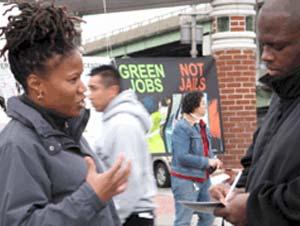Reviving the Bronx with green jobs
Majora Carter campaigns for green jobs at Hunts Point in the Bronx. (Image: James Chase)
The following is a partial transcript; for full story, listen to audio.
About 30 years ago the poor African American and Latino neighborhoods of the South Bronx were burning — landlords were torching apartment buildings for insurance money. And there was plenty of pollution, violence and crime, as well.
An aspiring young filmmaker named Majora Carter first escaped the South Bronx to go to an elite private college, but then she headed back to the ghetto and ended up sparking a crusade to clean up its environment.
Carter's initial reasons for going back to the South Bronx were practical ones.
"I was broke, basically," said Carter. "I started graduate school and I needed a cheap place to stay and my parents, you know, one of my parent's bedrooms was the best place. I was the youngest of ten kids … we were all gone at the time, but fortunately, they allowed me to move back home."
When she finished graduate school, Carter left; but was eventually drawn back.
"I realize that all the things that I thought about my community, that we were this poor community that just got into the situation that it was in because it didn't care enough about itself.
And that absolutely was completely untrue. The point is that there were huge forces generating from outside of the community, you know policy makers, many elected officials.
We unfortunately had a state environmental department that had never seen a permit for a waste facility they didn't allow to come into this community. We saw the evidence of it in terms of the asthma rate and it was one of those things that just hit me like a ton of bricks. We I realized that all the things I thought to be true about myself and my community actually were not."
In a place like the South Bronx, where joblessness and violence, and a lot of other pressing social problems are still clambering for attention, one would think that an issue like the environment would be a tough sell; but Carter found a way to get heard.
"Well, it's not so tough when we pitch it the way that we do, which is about how do you create wealth and health for people? We actually learned the lesson a long time ago that in our community we don't really talk about the environment — we talk about things like public health; we talk about things like job creation.
"And starting one of the country's first green jobs training and placement system, right here in the South Bronx, we were able to do that because we listen to people talk about what was important to them. And, in particular, economic empowerment via jobs was a huge thing. What we wanted to do was help them see how they're both economic, as well as their personal self interest was tied up to make the environment a better place for them and their families."
Carter did this through the Green Jobs training program, which offered many in the community opportunities they simply did not have before.
"You know, look, I gotta tell you that many of the folks that came through our Green Jobs training program, many of them had been arrested, many times over in some cases, for selling weed on the street. These guys — and gals — are not making huge amounts of money, so when many of these folks were able to get jobs 25,000 dollars a year, with bennies, they were thrilled."
The environmental movement has done a "terrible" job of integrating, says Carter, and that's one of the reasons people of color and the poor don't feel a connection with environmental issues.
"So, I think that was easy to do when it was just like, okay the environment only exists in a national park. That's not a helpful thing when you're really trying to help people understand the value of it because most people don't have that experience. I mean, I remember, you know, and it wasn't that long ago when I was referred to only as an environmental justice activist and not an environmentalist. And, I remember having to very carefully and gently always remind people, I'm an environmentalist, just like you guys. And just reminding them that it's going to take all of us to move this forward. And so I think that we still have a long ways to go, in terms of really fully embracing all different types of people."
Majora Carter is president of the Majora Carter group, and the founder of Sustainable South Bronx.
Hosted by Steve Curwood, "Living on Earth" is an award-winning environmental news program that delves into the leading issues affecting the world we inhabit.
